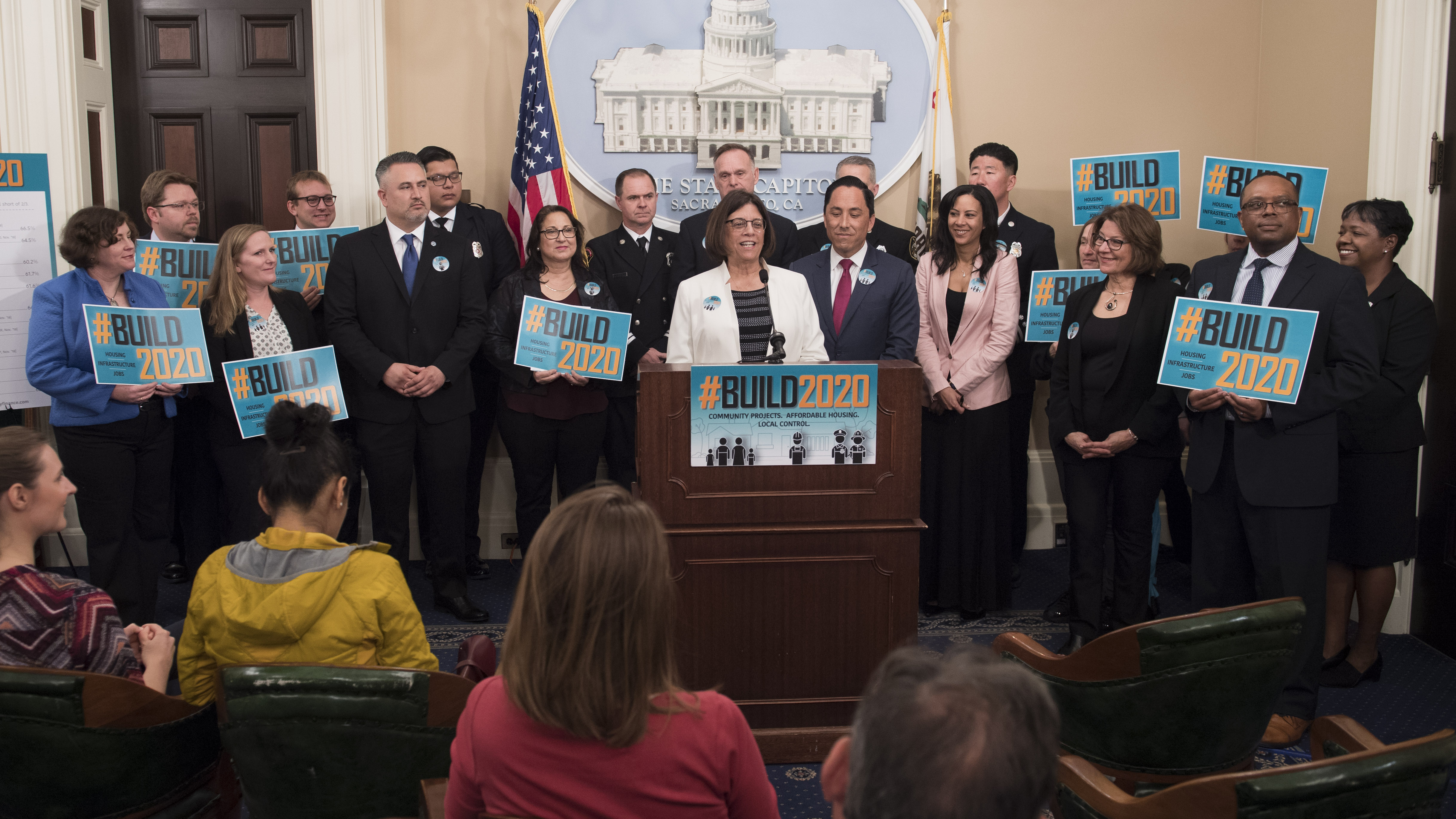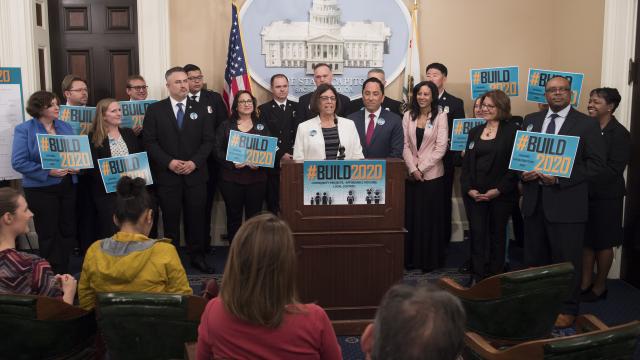

Sacramento, CA – Assemblymember Cecilia Aguiar-Curry (D – Winters) and several of her Assembly colleagues held a press conference and rally yesterday in support of ACA 1, a constitutional amendment to boost local investment in infrastructure and affordable housing. Following the hearing, Aguiar-Curry presented the bill in the Assembly Local Government Committee, where it passed successfully on a 5-2, party-line vote.
ACA 1 would ask California Voters to approve a reduction of the vote threshold for the approval of bond and special tax measures for local affordable housing, supportive housing, and public infrastructure projects from a two-thirds vote to a 55 percent majority. This is the same vote threshold that currently applies to all local school construction bond measures. By making this change, ACA 1 puts housing and infrastructure projects on par with school proposals, so that cities, counties, and special districts have a practical financing tool to address community needs.
“As a former Mayor of Winters, and board member of regional water, housing, and transportation agencies, I have seen first-hand the deterioration of our once world-class infrastructure. Now, as the Assembly Local Government Committee Chair, I continue to hear about deteriorating buildings, decrepit community facilities, and our extreme lack of affordable housing,” said Assemblymember Aguiar-Curry. “However, I also know first-hand that every single neighborhood, community, city, and county in California is different. This is why ACA 1 is targeted to help local communities fund critical projects and increase the supply of affordable and supportive housing.”
In practice, local officials propose a local bond or special tax to fund local priority projects, and then the voters in that community decide whether they support the idea or not. The voters would still need to overwhelmingly – with 55 percent of the vote – support a bond or special tax in order for it to be approved. Local officials will still control which priorities they recommend to voters, and local voters will still control how and where their infrastructure bond or tax dollars would be spent.
Since 2001, over 2,200 local revenue measures were placed before voters, and nearly 80 percent of all two-thirds supermajority measures garnered more than 55 percent “yes” votes, but ultimately failed passage because they fell slightly short of the two-thirds vote threshold. If this amendment became law, those measures to fund local investments and create jobs would have passed.
“We have taken away a series of tools for local governments in our State to invest in their communities. This is an especially difficult burden for small cities and towns like the ones in my 4th Assembly District,” said Assemblymember Aguiar-Curry. “A two-thirds vote threshold is discriminatory. At the end of the day, the question is whether in our California democracy we think one voter should count half as much as another. I think the time has come that we should all count equally.”
With ongoing discussions in Washington D.C. about a possible federal infrastructure funding bill, the opportunity to generate matching dollars locally to compete for grants is critical. For every dollar spent on infrastructure and development, there is a return benefit of several dollars back to our economy from the related construction jobs and activities, in addition to improving residents’ quality of life.
The Housing Committee Chairs from each House, Senator Scott Weiner (D-San Francisco) and Assemblymember David Chiu (D-San Francisco), have joined as Principal Coauthors. This brings the total number of bicameral coauthors to 37.
Assemblymember David Chiu was one of the supporting votes cast in committee. According to Chiu, “Local communities deserve a fair chance at making sure that their residents can afford to pay the rent or buy a home. California’s housing affordability crisis requires real investment across the entire state, and I applaud Assemblymember Aguiar-Curry for helping us get there.”
ACA 1 is sponsored by the California State Building Trades, California Professional Firefighters, and Housing California, along with many other supporters who participated in the press conference. Some of their remarks are included below:
Cesar Diaz, Legislative and Political Director for the California State Building Trades: “ACA 1 will provide parity with school districts by leveling the field to pass local funding measures, so that local communities are not blocked by small groups of voters and are able to provide for themselves and their local priorities. Our state and its local political subdivisions are under enormous pressure to maintain our existing infrastructure, as well as address infrastructure needs caused by climate change, building more housing, and providing for vital services that improve the quality of life for all residents and communities throughout the state.”
Lisa Hershey, Executive Director of Housing California: “A majority of Californians continue to vote in favor of providing homes that are affordable to their neighbors earning modest wages, living on low social security incomes, or experiencing homelessness, yet current law requires a two-thirds majority to fund this critical infrastructure. Housing California believes such a high threshold is undemocratic. That’s why we support ACA 1, which will allow voters to decide if they want to approve homes and services California families and seniors need with a 55 percent vote.”
Brian Rice – President, CA Professional Firefighters: “Ultimately, ACA 1 gives California voters greater control over how their taxes are spent and raised, and makes us better able to meet the challenges that we as firefighters face in California. ACA 1 is not a tax, and it is not an introduction of new revenue. It is a chance for the voters to look at the 2/3 versus a 55% threshold and make a decision on that.”
Carolyn Coleman, Executive Director of the League of California Cities: “Every day, cities all over the state are grappling with the need to improve and maintain our infrastructure: our roads, our bridges, and our streets, and today, we might say our potholes. The League stands proudly to support ACA 1. It will provide additional flexibility to our local agencies to secure the resources needed to fund these critical investments in our communities.”
ACA 1 will now go to the Assembly Appropriations Committee for a discussion about the fiscal components of the proposal. Because the bill would change the California Constitution, the proposal would need to be placed on the November 2020 ballot for approval by the voters, should the Legislature pass it first.
“We need a renewed effort at every level of government to support our economy with modern, safe housing, public buildings, parks, alternative transportation, and streets and roads. ACA 1 will empower local officials to ask their voters to approve their vision for how and when to invest in these projects,” said Aguiar-Curry. “Local communities know their priorities best. This constitutional amendment will offer an improved tool for local leaders to prioritize projects and determine how to best pay for them.”
Aguiar-Curry represents the 4th Assembly District, which includes all of Lake and Napa Counties, all of Yolo County except West Sacramento, and parts of Colusa , Solano , and Sonoma Counties.
www.asm.ca.gov/aguiar-curry
###
